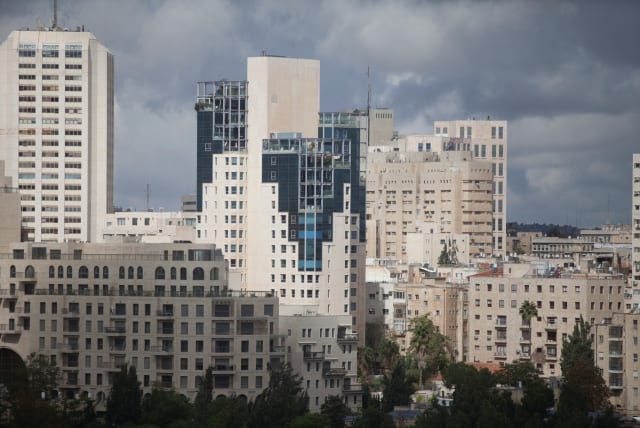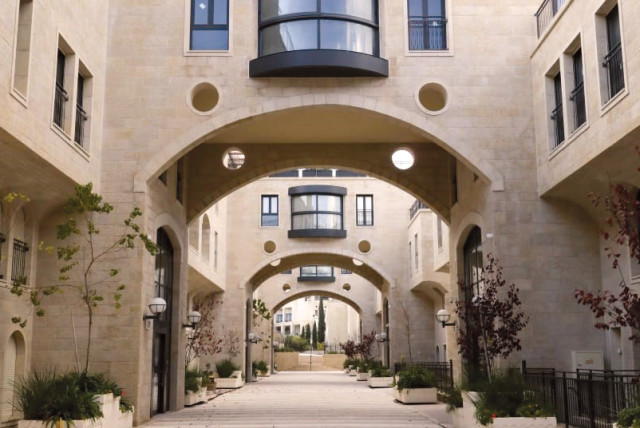Ghost apartments: How empty homes haunt Jerusalem's housing landscape

The term “ghost apartments” remain unoccupied for extended periods, often year-round. This is how they profoundly impact the housing market in Israel's capital.

Walking through Jerusalem’s streets, a glance at the sky reveals a skyline dotted with cranes, construction sites, and projects galore. Our eternal capital has been undergoing urban regeneration on a massive scale since the turn of the century, as the municipality and government look to transform an ancient city and hodgepodge of neighborhoods into a contemporary, manageable 21st-century city.
One of the significant projects citywide has been modernizing older apartment blocks, whether through the TAMA 38 initiative or other such projects. There is also a wide-scale building of new apartments, and new neighborhoods have been springing up, such as Arnona Hills in the south of the city.
One problem that both old and new apartments face is the lack of long-term occupation throughout the year.
Ghost apartments: The crisis of homes that stay empty
The term “ghost apartments” may conjure images of eerie, abandoned dwellings, but it describes a pervasive phenomenon in Jerusalem’s real estate market. These properties, predominantly apartments or houses, remain unoccupied for extended periods, often year-round. The government defines them as apartments unoccupied for nine out of the 12 months of the year.
According to numbers published by the Central Bureau of Statistics in 2018, there were some 170,300 unoccupied apartments in Israel. Of these, 15,000 were reported as ghost apartments in Jerusalem. Statistics include owners who have died and left their apartments empty; the elderly who have moved into retirement homes; and run-down or abandoned buildings.
Ghost apartments are not unique to Jerusalem; they exist in various other parts of Israel, such as Tel Aviv and Haifa. However, their prevalence in the capital is particularly noteworthy, as a large number of the vacant homes in Jerusalem are owned by those who live abroad and use them as vacation homes.
ACCORDING TO real estate professionals, these properties sit empty due to a range of factors, including owners’ preferences for occasional use; investment purposes; or concerns about rental management.
“I have sold many apartments that remain empty the majority of the year,” one Jerusalem-based real estate agent who asked to remain anonymous told In Jerusalem. “These properties often sit empty due to the owners’ preference not to rent them out or use them as primary residences. Since COVID and the war in Gaza, people also want immediate access to their homes.
“Ghost apartments are quite common in certain areas of Jerusalem, especially in upscale neighborhoods like Rehavia, the German Colony, and parts of the city center. Many property owners in these areas choose to keep their apartments vacant for personal use or investment purposes rather than renting them out.”
While some may see them as a form of investment or a second home, their presence has significant implications for the city’s economy, population dynamics, and housing affordability.
On the one hand, these properties contribute to housing shortages, particularly in areas where demand is high, as it always is in Jerusalem. The city is Israel’s capital and one of the country’s major urban centers. In addition to the thousands of new immigrants who move to Jerusalem every year, there is an influx of students and workers from across Israel who arrive annually.
This scarcity can drive up rental prices, making it challenging for residents, especially young families and low-income individuals, to find affordable housing.
As then-Jerusalem mayor Nir Barkat stated in 2017, “Young people are Jerusalem’s oxygen, and we are always working to attract young people and young families to the city.”
The young, however, are finding it difficult to keep up with Jerusalem’s prices.
“There are several factors at play,” the real estate agent explained. “Firstly, some owners see real estate in Jerusalem as a long-term investment or a second home for occasional use, rather than a rental property. Additionally, there’s a desire among certain property owners to maintain control over their residences, ensuring that they are available whenever needed.
“The presence of ghost apartments can affect the local market dynamics in several ways,” the real estate agent explained. “It can create a shortage of available housing for long-term renters, potentially driving up rental prices in certain neighborhoods. On the other hand, it can contribute to the overall stability of property values in desirable areas.”
Moreover, the prevalence of ghost apartments may hinder the economic benefits of tourism. While these properties may attract visitors seeking short-term accommodation, their long-term vacancy detracts from the vibrancy of local neighborhoods and diminishes opportunities for economic growth stemming from permanent residents. A neighborhood that stands half empty will suffer in comparison to a populated and thriving area.
“I would say the trend of vacant apartments has grown in the past few years, especially in the aftermath of events like the pandemic and regional tensions,” the real estate agent said.
Regarding the percentage of ghost apartments he has sold, the agent told In Jerusalem, “Around half of the apartments I have sold this year I would describe as ghost apartments. Many property owners have become more cautious about renting out their homes due to concerns about health, security, and the ability to access their properties promptly when needed.”
ADDRESSING THE issue of ghost apartments requires a multifaceted approach involving regulatory measures, incentives, and community engagement. Policies could be introduced to encourage property owners to rent out their apartments or impose penalties for leaving properties vacant for extended periods.
The government has attempted several times to introduce legislation doubling the municipal tax (arnona) on ghost apartments to incentivize owners to sell or rent them out (or live in them full time), but these protocols have repeatedly fallen at a bureaucratic level.
“Addressing ghost apartments would likely require a varied approach involving both administrative measures and incentives,” the real estate agent told In Jerusalem. “For instance, policies could be introduced to encourage property owners to rent out their apartments or impose penalties for leaving properties vacant for extended periods.
“The future of ghost apartments will likely be shaped by broader economic and social trends of Israel as a whole,” the agent explained. “As Jerusalem continues to grow and evolve, as it has done the past decade, there may be shifts in housing preferences, or regulation might eventually be brought in that could influence the usage of those properties currently sitting empty.”
Overarching economic and social shifts will likely influence the trajectory of ghost apartments in Jerusalem in the coming years. As the city continues to evolve with new neighborhoods and better infrastructure, shifts in housing preferences and regulations may influence the utilization of these properties.
Moreover, as antisemitism continues to spike globally, more Diaspora Jews may find themselves compelled to purchase that “just-in-case” property in Israel.
While ghost apartments may offer benefits to property owners, their long-term vacancy poses serious challenges to the city. Finding a balance of property rights, investment incentives, and community needs will be essential in addressing this complex issue and fostering a vibrant and inclusive housing market in Jerusalem. ■
Jerusalem Post Store
`; document.getElementById("linkPremium").innerHTML = cont; var divWithLink = document.getElementById("premium-link"); if (divWithLink !== null && divWithLink !== 'undefined') { divWithLink.style.border = "solid 1px #cb0f3e"; divWithLink.style.textAlign = "center"; divWithLink.style.marginBottom = "15px"; divWithLink.style.marginTop = "15px"; divWithLink.style.width = "100%"; divWithLink.style.backgroundColor = "#122952"; divWithLink.style.color = "#ffffff"; divWithLink.style.lineHeight = "1.5"; } } (function (v, i) { });


